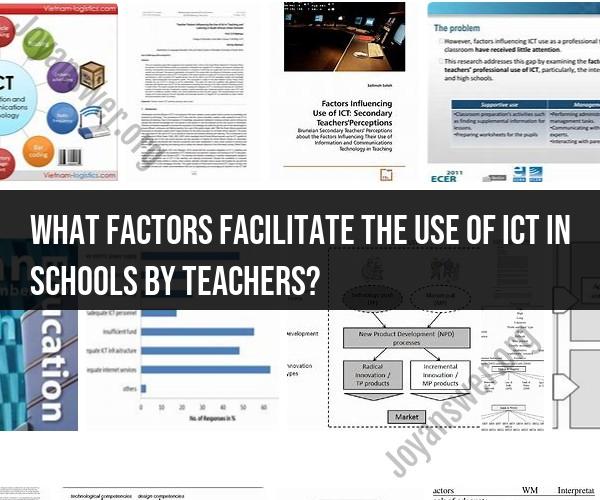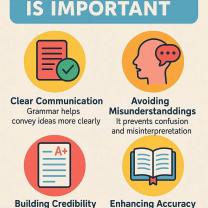What factors facilitate the use of ICT in schools by teachers?
The successful integration of Information and Communication Technology (ICT) in schools by teachers is influenced by various factors. Here are key factors that facilitate the use of ICT in educational settings:
Teacher Training and Professional Development:
- Adequate training and professional development opportunities are crucial. Teachers need to be comfortable with ICT tools, software, and hardware, as well as instructional strategies for incorporating technology effectively into their lessons.
Access to Technology and Infrastructure:
- Schools must have access to reliable ICT infrastructure, including computers, tablets, internet connectivity, and interactive whiteboards. Teachers need access to these resources in classrooms to use them effectively.
Technical Support and Maintenance:
- Ongoing technical support and maintenance services are essential to ensure that ICT resources remain functional and up-to-date. Teachers should have a point of contact for addressing technical issues.
Curriculum Integration:
- The integration of ICT should be aligned with the curriculum and learning objectives. Teachers need guidance on how to integrate technology seamlessly into their lessons and assessments.
Digital Learning Resources:
- Access to high-quality digital content, educational apps, and online resources can enhance teaching and learning. Teachers should have access to a repository of digital learning materials.
Pedagogical Support:
- Support from educational specialists who understand how to use technology to enhance pedagogy is crucial. Teachers benefit from guidance on creating engaging, technology-rich learning experiences.
Administrative Support and Leadership:
- School administrators and leaders should champion the use of ICT and provide a supportive environment. This includes policies, funding, and recognition for innovative technology use.
Collaborative Culture:
- A culture of collaboration and sharing among teachers can foster the effective use of ICT. Teachers should have opportunities to exchange ideas, best practices, and lesson plans related to technology integration.
Student Engagement:
- Teachers should aim to create engaging and interactive learning experiences with ICT that capture students' interest and motivation. When students are engaged, they are more likely to benefit from technology-enhanced instruction.
Assessment and Feedback:
- Effective assessment practices should include both formative and summative assessments that take advantage of technology. Teachers need guidance on using digital tools for assessment and providing timely feedback to students.
Digital Citizenship and Safety Education:
- Teachers should educate students about responsible and safe use of technology, including online etiquette, privacy, and digital literacy skills.
Flexibility and Adaptability:
- Teachers who are flexible and adaptable in their teaching methods can more easily integrate new technologies as they emerge. A willingness to experiment and learn from failures is essential.
Parent and Community Involvement:
- Involving parents and the community in understanding the benefits of ICT in education can garner support and create a holistic approach to technology integration.
Research and Evaluation:
- Ongoing research and evaluation of the impact of ICT in education help inform best practices and ensure that resources are allocated effectively.
Policy and Funding:
- Government policies and funding initiatives can play a significant role in providing schools with the necessary resources and incentives to integrate ICT effectively.
These factors interact and complement each other in facilitating the successful use of ICT in schools by teachers. Effective technology integration requires a comprehensive approach that addresses both the technical and pedagogical aspects of teaching and learning with technology.
Enabling the Use of ICT in Schools by Teachers: Key Factors
Here are some key factors that can enable the use of ICT in schools by teachers:
- Access to ICT resources: Teachers need to have access to ICT resources, such as computers, internet, and software, in order to use ICT in their teaching.
- Professional development: Teachers need to be trained on how to use ICT effectively in their teaching. This training should cover both the technical aspects of using ICT and the pedagogical aspects of integrating ICT into teaching and learning.
- Support from school administrators: School administrators need to support teachers in their use of ICT. This can be done by providing them with access to resources, professional development opportunities, and time to integrate ICT into their teaching.
- A positive attitude towards ICT: Teachers need to have a positive attitude towards ICT in order to be willing to use it in their teaching. This attitude can be fostered by providing teachers with opportunities to experience the benefits of using ICT in education.
Facilitating Teachers' Integration of ICT in Educational Settings
Here are some ways to facilitate teachers' integration of ICT in educational settings:
- Provide teachers with access to ICT resources: This includes providing them with computers, internet, and software. It is also important to provide teachers with access to printers and other peripherals.
- Offer professional development opportunities: Teachers need to be trained on how to use ICT effectively in their teaching. This training should cover both the technical aspects of using ICT and the pedagogical aspects of integrating ICT into teaching and learning.
- Provide teachers with support: Teachers need to have access to support when they are using ICT in their teaching. This support can come from other teachers, school administrators, or ICT specialists.
- Encourage teachers to share their experiences: Teachers can learn from each other by sharing their experiences with using ICT in the classroom. This can be done through formal workshops or informal conversations.
Factors Promoting the Effective Utilization of ICT by Educators
Here are some factors that promote the effective utilization of ICT by educators:
- ICT integration in curriculum: ICT should be integrated into the curriculum in a meaningful way. This means that ICT should be used to support teaching and learning objectives, rather than being used as an end in itself.
- Pedagogical use of ICT: Teachers should use ICT in a way that is pedagogically sound. This means using ICT to enhance teaching and learning, rather than simply using it to deliver content.
- Assessment of ICT use: Teachers should assess the impact of ICT on student learning. This assessment should be used to inform future teaching and learning practices.
By considering these factors, schools and districts can create an environment that enables and supports the effective use of ICT by teachers.












